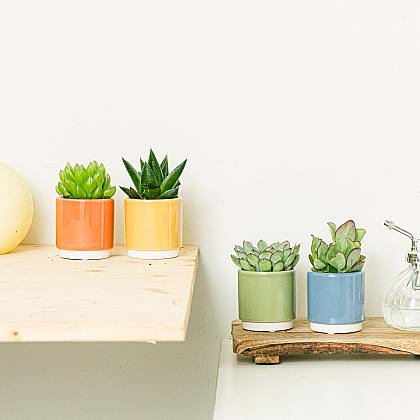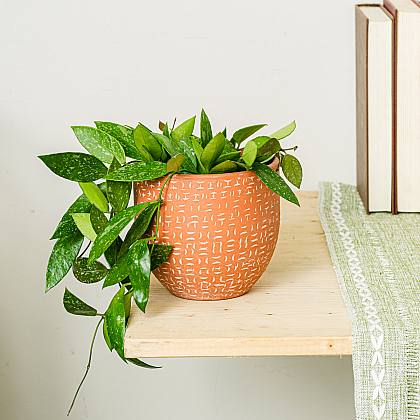Plants without natural light: the perfect alternative for dark environments
Plants are essential elements in our environment, not only because of their beauty and ability to transform our indoor and outdoor spaces, but also because of their role in purifying the air and improving our health
Plants are essential elements in our environment, not only because of their beauty and ability to transform our indoor and outdoor spaces, but also because of their role in purifying the air and improving our health. However, in some cases, the lack of natural light can make it difficult to grow and maintain plants. Fortunately, there are options for those looking to add a touch of green to their dark environments. In this article, we'll explore plants that can survive without natural light, their importance in air purification, and how to properly care for them to keep them healthy and vibrant. Discover how you can transform your dark interior spaces with these perfect alternatives for environments with little natural light.
The importance of plants in our environment
The importance of plants in our environment is undeniable. These green living things not only add beauty to our spaces, but also play a critical role in the health and well-being of human beings. Plants are able to produce oxygen through photosynthesis, which is vital for our survival. In addition, they act as natural filters, eliminating toxins and purifying the air we breathe. However, its impact is not just limited to the air we breathe. Plants also help regulate the humidity of the environment, creating a more comfortable environment and reducing problems related to dryness or excessive humidity. In addition, scientific studies have shown that the presence of plants indoors can have positive effects on our mental and emotional health. Plants help us reduce stress, improve mood, and increase productivity. In short, plants are essential for maintaining a healthy and balanced environment. Their presence in our homes, workplaces and public spaces is critical to improving our quality of life and ensuring a sustainable future.
Discovering the Plants That Survive Without Natural Light
Finding plants that survive without natural light may seem like a difficult task, but there are several options that can suit dark indoor spaces. One of them is Sansevieria, also known as mother-in-law's tongue. This plant is hardy and can grow in low-light environments, and it helps purify the air by removing toxins such as benzene and formaldehyde. Another option is Zamioculcas zamiifolia, a plant that doesn't require a lot of light or constant watering, making it ideal for those looking for an easy-to-care option. In addition, this plant has an exotic and elegant appearance thanks to its glossy and waxy leaves. Potos is another plant that can survive in low-light spaces. Not only is this climber rugged, but it can also help remove chemicals from the indoor air. English Ivy is another popular choice that adapts well to dark environments and can be grown in both pots and hanging baskets. Finally, Calathea is a tropical plant that can grow in spaces with low light and humidity. In addition to being hardy, this plant has beautifully decorated leaves with vibrant and colorful patterns. In summary, although plants need light to grow, there are several options that can survive in dark environments and help improve indoor air quality.
The Role of Plants in Air Purification
The role of plants in air purification is critical to maintaining a healthy indoor environment. Plants are capable of filtering and removing pollutants from the air, such as volatile organic compounds (VOCs) and toxins present in cleaning products, paints, or furniture. Through photosynthesis, plants absorb carbon dioxide and release oxygen, thus improving the quality of the air we breathe. In addition, plants can also reduce the concentration of suspended particles, such as dust or pollen, by trapping them in their leaves and roots. Scientific studies have shown that having plants indoors can decrease symptoms associated with sick building syndrome, such as headaches, eye irritation, or respiratory problems. Some of the most efficient plants at purifying the air are pothos, mother-in-law's tongue, and ficus benjamina. These species are able to tolerate environments with little natural light and are excellent choices for decorating dark indoor spaces. Incorporating these plants into our home or office not only brings aesthetic beauty, but also contributes to improving our health and well-being by providing us with cleaner and fresher air.
Plants without natural light: a solution for dark indoor spaces
While it's true that plants need light to survive, there are some species that can grow in dark indoor environments. Plants without natural light are an excellent option for those spaces in our home or workplace that lack natural lighting, such as basements, bathrooms, or rooms with few windows. Among the plants that survive without natural light are Sansevieria, also known as "mother-in-law's tongue," Poto, Spatiphyllum, and Ficus robusta. Not only do these plants adapt to low-light environments, but they are also able to purify the air, removing toxic substances such as formaldehyde and benzene. In addition, plants without natural light can improve people's quality of life by providing a cooler and more relaxing environment. However, it's important to note that these plants need special care to stay healthy, such as watering them sparingly and avoiding exposing them to extreme temperatures. In short, plants without natural light are an excellent solution for those dark indoor spaces that need a touch of life and freshness.
Tips for Caring for and Maintaining Plants Without Natural Light
Tips for caring for and maintaining plants without natural light:
If you've decided to add plants without natural light to your home or office, it's important to know some tips for proper care and maintenance. First and foremost, it's essential to choose the right plants that are suited to low-light environments. Some popular options include sansevieria, zz plant, and Boston fern. These plants are known for their hardiness and ability to survive in low-light conditions.
Additionally, it is important not to expose them directly to strong sunlight, as this could damage their sensitive leaves. Placing them near a window with indirect light is an ideal option. It is also advisable to rotate them from time to time so that all parts of the plant receive an equal amount of light.
When it comes to watering, it's critical to avoid overwatering, as plants without natural light tend to require less water than those exposed to direct sunlight. Before watering, check the soil moisture by sticking a finger into the soil. If it's dry to a depth of about two centimeters, it's time to water.
Finally, it's important to remember that even though plants without natural light require less attention in terms of direct sunlight, they still need regular care. This includes removing dead or diseased leaves, fertilizing occasionally, and making sure they are free of pests.
By following these tips, you can enjoy the beauty and benefits of having plants without natural light in your dark environment. Not only will they add life and color to your indoor spaces, but they will also contribute to improving air quality and creating a healthier, more welcoming environment.
The beauty and variety of plants without natural light
Plants without natural light are a perfect choice for those who want to add a touch of beauty and life to their dark interior spaces. These plants come in a variety of shapes, sizes, and colors, making them a very versatile choice for home or office décor. From small succulents to large ferns, there is a wide range of plants that can survive in environments with little natural light. Plants like Sansevieria trifasciata, also known as "mother-in-law's tongue," are a great choice for those looking for a hardy, easy-to-care plant, while Begonias rex are ideal for adding a pop of color to dark indoor spaces. In addition, plants without natural light are not only beautiful, but they can also help purify indoor air by removing toxins and improving air quality. Some plants, such as Ficus benjamina, even have Air-Purifying Properties that can help reduce levels of formaldehyde and other volatile organic compounds in the air. Overall, plants without natural light offer a myriad of options to add beauty and life to any dark indoor space, while also providing health and wellness benefits.
Transform your dark environments with plants without natural light
Transform your dark environments with plants without natural light
If you have dark and dingy indoor spaces, don't worry, there's a perfect solution: plants without natural light. These plants are ideal for transforming your dark environments into vibrant, lively spaces. With their unique ability to survive in low-light conditions, these plants are the perfect alternative for those places where natural light is scarce.
Plants without natural light not only add color and beauty to your spaces, but also have a positive impact on the environment. These plants are able to purify the air by absorbing toxins and releasing fresh oxygen, which improves indoor air quality. Additionally, their presence can help reduce stress levels and promote a sense of calm and well-being.
To care for and maintain these plants without natural light, it's important to keep a few tips in mind. make sure you provide them with the right amount of water, avoiding both over- and under-watering. In addition, it is advisable to use pots with good drainage to avoid waterlogging of the roots.
The variety of plants without natural light is amazing. From ferns to sansevierias, there is a wide range of options to choose from. Each plant has its own personality and unique characteristics, so you can experiment with different species and create interesting and attractive compositions.
So don't let the lack of natural light limit the beauty and vibrancy of your interior spaces. Transform your dark environments with plants without natural light and enjoy the freshness and charm that these plants can bring to your home or office.
In conclusion, plants without natural light can be an excellent alternative for those indoor spaces that do not receive enough sunlight. In addition to adding beauty and variety to our environments, these plants also play an important role in purifying the air and can improve our health and well-being. However, it is important to remember that these plants still need some care and attention to survive in less favorable conditions. Therefore, it is necessary to research and know the specific needs of each plant before incorporating them into our home or office. Additionally, we must consider the environmental impact of our choices when choosing plants that are sustainable and environmentally friendly. Ultimately, incorporating plants without natural light can be a simple yet effective way to transform our dark spaces into greener, healthier places


